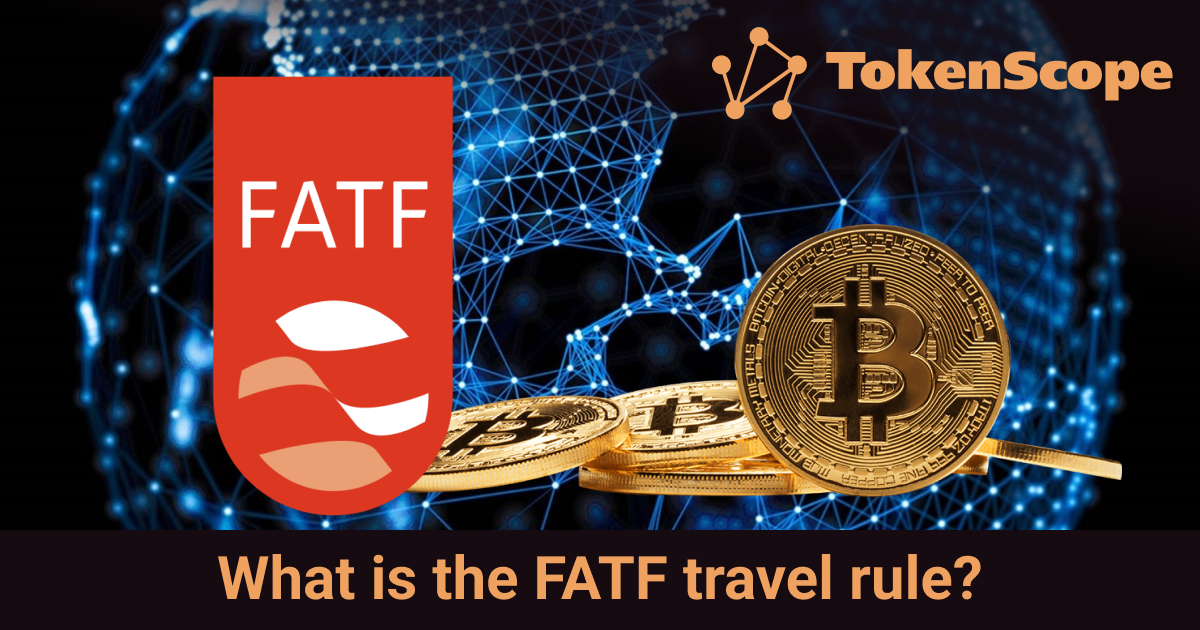
Europe and the United States continue to strengthen their anti-money laundering laws to prevent illicit activities. On both continents lawmakers right now are debating on how to apply AML/CFT international requirement in the future and whether is it necessary to lower an existing Travel Rule’s threshold as money laundering and terrorism financing risks are increasing. The United Kingdom recently introduced its amendments to the AML/CFT regulations, including proposals to the Travel Rule threshold of £1000, as well. The TokenScope Team couldn’t stay aside and not to explain the meaning of this one of the recently most discussed requirements of international AML/CFT standards.
The Financial Action Task Force (FATF) is the global money laundering and terrorist financing watchdog. This is an inter-governmental body that sets international standards to prevent these illegal activities and the harm they cause to society. The FATF has developed 40 Recommendations which countries should implement through measures adapted to their particular circumstances.
In October 2018, the FATF adopted changes to the 40 Recommendations to clarify that they apply to financial activities involving virtual assets, effectively expanding the scope of the Recommendations to apply to virtual asset service providers (VASPs) and other companies that provide virtual assets services.
The Travel Rule, also known as Recommendation №16, requires all financial institutions and other money service providers including VASPs to share the information of the originators and beneficiaries of transactions that exceed a threshold of $ 1000. The Travel Rule applies to both domestic and cross-border transfers.
Countries should ensure that VASPs collect and include required and accurate originator information, and required beneficiary information, on cryptocurrency transfers and related messages. VASPs should also monitor transactions to detect those which lack the required originator and beneficiary information and screen all transactions to properly manage AML/CFT risks.
According to the FATF Recommendations VASPs need to perform Know Your Customer (KYC) checks for every transaction, rule out the possibility for anonymous transactions and transfer following information from the originators to beneficiaries:
- The names of the sender and the recipient;
- The address of the sender;
- The account number of the sender and the recipient;
- Sender’s unique identity number and it’s date and place of birth.
The Travel Rule doesn’t only allow VASPs to comply with international AML/CFT regulations but also makes crypto-assets transactions more transparent and easy-accessible for law-enforcement authorities while they proceed financial investigation. Also, this regulation should be implemented globally and could open the door for further unified crypto standards.
The first challenge associated with the Travel Rule in crypto industry revolves around the nonuniform approach to the implementation of this regulation in different regions. As there is no one common standard, the requirements of the travel rule differ from country to country.
The FATF itself does not prescribe a particular technology or software approach that VASPs should deploy to implement the Travel Rule. Any technology or software solution is acceptable, so long as it enables the ordering and beneficiary institution to comply with its AML/CFT obligations.
Nevertheless, according to the Travel Rule all VASPs are required to exchange transaction details, there is a need for an interoperable communication system such that VASPs can easily receive and send. This means that the crypto industry must embrace a unified approach to settle the appropriate data and communication standards.
Many developers and companies focused on implementing a solution to comply with the FATF Travel rule requirements. In most cases the solution is being developed be one of the industry players with no support of any governmental bodies. Despite this fact all of them share the same goal to create a simple product that doesn’t impose additional requirements, can be integrated into existing business solutions and provides interoperability.
Crypto service providers are developing many adopting protocols specially designed to aid the transfer and collection of encrypted data. There are several companies that have already presented their approach to the market. By now on market exists more than 20 solutions, based on various approaches. There are also some open-source developments.
To reach an unified standard, the US Chamber of Digital Commerce (CDC), the Organization of Global Digital Finance (GDF) and the International Association of Digital Asset Exchanges (IDAXA) have created a joint working group. In 2020 they introduced a single data exchange standard that VASPs must share with each other - InterVASP 101 (IVMS101). It allows VASPs to identify anonymous senders and recipients of crypto payments, automatically attach required data to each transaction. This allows not only to fulfill the requirements of regulators, but also to significantly reduce the number of possible errors and costs. IVMS101 received support from most notable solution developers.
TokenScope Team will continue following the news of development of a common standard in the FATF Travel rule as it makes crypto transfers safer and users more secure from scam. Don't forget to check addresses for risks, it can help to save your funds! Also, you can report us any cases related to specific cryptocurrency addresses and the considered risks at TokenScope via «Reporting a cryptocurrency address» form. This will help to protect other users from the risks of interacting with such addresses and their owners.